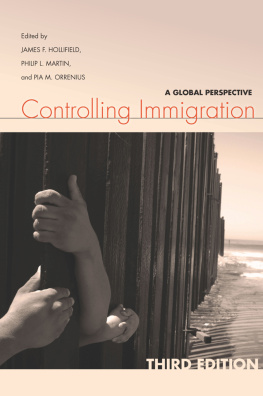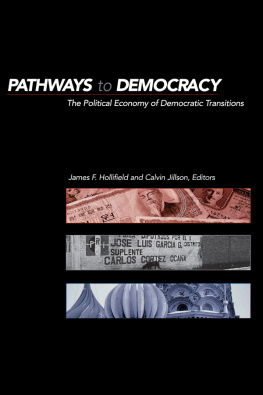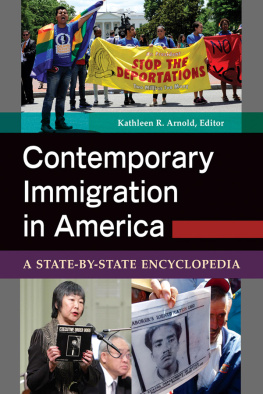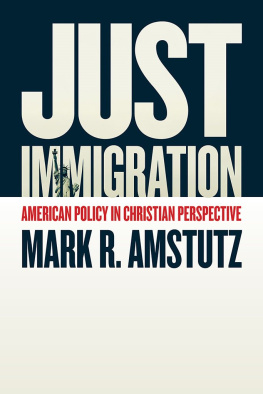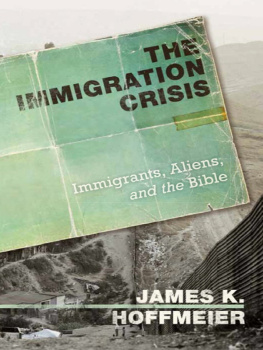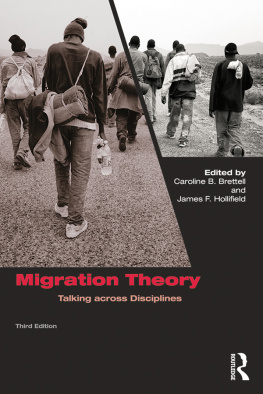Stanford University Press
Stanford, California
1994, 2004, 2014 by the Board of Trustees of the Leland Stanford Junior University. All rights reserved.
No part of this book may be reproduced or transmitted in any form or by any means, electronic or mechanical, including photocopying and recording, or in any information storage or retrieval system without the prior written permission of Stanford University Press.
Printed in the United States of America on acid-free, archival-quality paper
Library of Congress Cataloging-in-Publication Data
Controlling immigration : a global perspective / edited by James F. Hollifield, Philip L. Martin, and Pia Orrenius. Third edition.
pages cm
Includes bibliographical references and index.
ISBN 978-0-8047-8626-3 (cloth : alk. paper)ISBN 978-0-8047-8627-0 (pbk. : alk. paper)
1. Emigration and immigrationGovernment policyCross-cultural studies. 2. ImmigrantsGovernment policyCross-cultural studies. 3. Human rightsCross-cultural studies. I. Hollifield, James Frank, editor of compilation. II. Martin, Philip L., editor of compilation. III. Orrenius, Pia M., editor of compilation.
JV6271.C66 2014
325'.1dc23
2013043603
ISBN 978-0-8047-8735-2 (electronic)
Typeset by Newgen in 10/14 Minion
CONTROLLING IMMIGRATION
A GLOBAL PERSPECTIVE
THIRD EDITION
EDITED BY
JAMES F. HOLLIFIELD, PHILIP L. MARTIN, AND PIA M. ORRENIUS
STANFORD UNIVERSITY PRESS
Stanford, California
PREFACE
The idea for this book began in 1990 at the Center for US-Mexican Studies at the University of California at San Diego (UCSD) with a National Science Foundation (NSF) research project comparing national efforts to manage migration under the direction of Wayne A. Cornelius, Philip L. Martin, and James F. Hollifield. National studies of migration data and control systems that grew out of the NSF project were published as the first edition of this book in 1994 by Stanford University Press. A second edition appeared in 2004.
The third edition continues the effort to use systematic, cross-national research to examine the gap between the goals and outcomes of immigration policies in the major immigrant-receiving countries. A generation of scholars and students has wrestled with this question, which continues to drive research agendas in the multidisciplinary field of migration studies. We hope that the third edition will shed new light on the dilemmas of immigration control and help to advance the comparative study of immigration policy.
This book is divided into three parts: (1) nations of immigrants, in which immigration is part of the founding national ideal; (2) countries of immigration, in which immigration has come to play an important role in social and economic development but is not part of the process of nation building; and (3) latecomers to immigrationcountries that once sent migrants abroad but in the past few decades made the transition from sending to receiving societies. Each country study is followed by one or more commentaries by scholars and policymakers who offer a critique and, in some cases, an alternative interpretation of policy developments. While keeping the focus on the major receiving countries of North America, Europe, Australia, and East Asia, we have added new chapters on Scandinavia and Switzerland, as well as a special section on the European Union and the global governance of migration.
Our work has benefited from the input of migration scholars and students from around the globe. The workshop for the second edition was hosted by the Center for Comparative Immigration Studies at UCSD, and the third conference, the basis for this edition, was organized by the John Goodwin Tower Center for Political Studies at Southern Methodist University (SMU) in conjunction with the Federal Reserve Bank of Dallas.
We are grateful to all who participated in this conference and to the staff of the Tower Center and the Dallas Fed for their invaluable administrative support. The project was underwritten by the Marian Tower International Conference Fund of the Tower Center at SMU, and supported by the Dallas Fed and the Canadian government. We would like specifically to thank Paula Caldwell St-Onge, Consul General of Canada for the South Central United States, for her support and that of her government. The editors and contributing authors are solely responsible for the information and views presented in this book, which do not necessarily represent those of the Federal Reserve Bank of Dallas or the underwriters.
Special thanks go to Ryan Swick, assistant to the director of the Tower Center, and Jieun Pyun, Communications Director of the Tower Center, for their tireless work on the project, and to Geoffrey Burn, executive editor of Stanford University Press, and his colleagues. Without their extraordinary patience, skill, and support, the third edition of Controlling Immigration might never have seen the light of day. To them we are deeply grateful.
James F. Hollifield
Philip L. Martin
Pia M. Orrenius
Dallas, Texas
March 2013
CONTRIBUTORS
RUT BERMEJO CASADO is a lecturer on politics at Rey Juan Carlos University in Madrid. Her publications on border controls and immigration policies include, most recently, Poltica migratoria y fronteras: La gestin de la inmigracin mediante agencias in Fronteras en movimiento: Migraciones en el contexto del euromediterrneo (2012); El proceso de institucionalizacin de la cooperacin en la gestin operativa de las fronteras externas de la UE in Revista CIDOB dAffairs Internationals (2010); and Migration and Security in the EU: Back to Fortress Europe? in the Journal of Contemporary European Research (2009). Her current research deals with immigration politics and policy design in Spain and the European Union.
ALEXANDER BETTS is university lecturer in refugee and forced migration studies in the Department of International Development at the University of Oxford. He is author or editor of numerous books, including Forced Migration and Global Politics (Wiley-Blackwell, 2009), Protection by Persuasion: International Cooperation in the Refugee Regime (Cornell University Press, 2009), Refugees in International Relations (with Gil Loescher, Oxford University Press, 2010), Global Migration Governance (Oxford University Press, 2011), UNHCR: The Politics and Practice of Refugee Protection (with Gil Loescher and James Milner, Routledge, 2012), and Survival Migration: Failed Governance and the Crisis of Displacement (Cornell University Press, 2013). He has worked for UNHCR and as a consultant to UNDP, UNICEF, IOM, the Council of Europe, and the Commonwealth Secretariat. He is now director of the Humanitarian Innovation Project at Oxford.
IRENE BLOEMRAAD is the Thomas Garden Barnes chair of Canadian studies and associate professor of sociology at the University of California, Berkeley, as well as a scholar with the Canadian Institute for Advanced Research. Her research examines immigrant incorporation into political and civic life, as well as the consequences of immigration on politics and understandings of membership. Her work reaches a broad, interdisciplinary audience, spanning articles in the American Journal of Sociology, the Canadian Journal of Political Science, Perspectives on Politics, the Journal of Interdisciplinary History, and the Nonprofit and Voluntary Sector Quarterly. Her books include Rallying forImmigrant Rights: The Fight for Inclusion in 21st Century America

